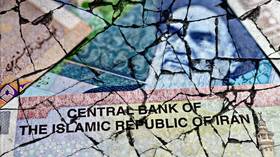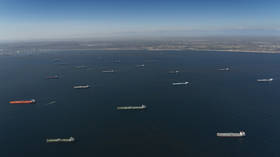Iran’s currency crashes to new record low amid flaring tensions with US

The Iranian rial hit a fresh low against the US dollar on Sunday, shortly after Washington unilaterally restored sweeping sanctions on Tehran, despite opposition from the international community and its own allies.
The dollar was selling for as much as 273,000 rials on the unofficial market, according to Iranian foreign exchange site Bonbast.com. Iran’s currency dropped by two percent against the US dollar in 24 hours – the second time in a week it has reached new lows. The rial has lost nearly half its value this year, and has depreciated most significantly since June.
Also on rt.com Rouhani says US ‘faces defeat’ as its attempt to reimpose UN sanctions on Iran met with international oppositionThe Iranian economy lost the bulk of its revenues when the US turned up the heat on its “maximum pressure” campaign against the Islamic Republic, after it withdrew from the landmark nuclear deal in 2018. The Trump administration has been trying to choke off Iranian oil sector, ending waivers for buyers of Iranian crude and threatening to sanction anyone who makes such purchases.
In a move that further escalated tensions, Washington announced late on Saturday the unilateral return of “virtually all” UN sanctions against Iran, which were lifted in accordance with the Joint Comprehensive Plan of Action (JPCOA). The agreement, signed by Iran, the US, Russia, China, the UK, Germany, and France in 2015, was aimed at halting Iran’s nuclear program in exchange for sanctions relief. Since the US returned to its sanctions policies, the Islamic Republic has begun gradually scaling down its commitments under the JCPOA, although it hasn’t ditched them completely.
Also on rt.com Chinese data shows Beijing continues Iranian oil importsThe remaining European parties, which have been working hard to keep the agreement from falling apart altogether, said the US’ “snapback mechanism” doesn’t have any legal effect, as the US is no longer part of the agreement. European countries have been at odds with Washington over Iran since the US’ withdrawal, and have created a special trade mechanism, the Instrument in Support of Trade Exchanges, known as INSTEX, to dodge some of the US restrictions.
For more stories on economy & finance visit RT's business section














